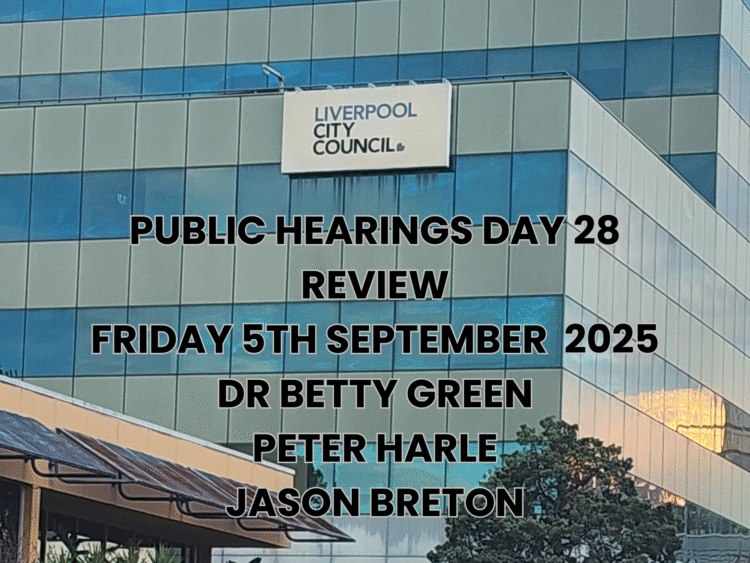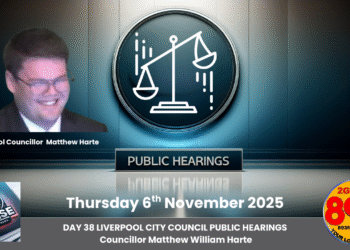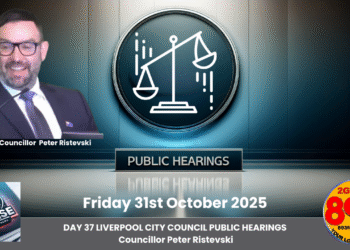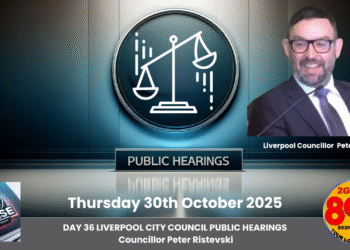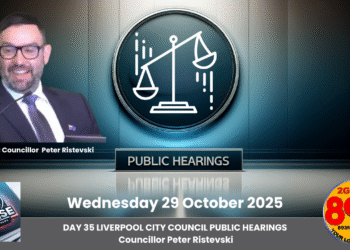Dr Betty Green’s Testimony: Conflicts of Interest and Council Dynamics
Dr Betty Green, a councillor who returned to her role in September 2024, provided evidence over two days, with her testimony on 5 September focusing on several critical areas. Under questioning from Ms Hamilton-Jewell, counsel for Mr P Ristevski, Dr Green discussed a CEO recruitment meeting on 20 February 2025, after which the recruitment panel was restructured. The new panel included Dr Green, Mayor Ned Mannoun, Councillor Ristevski, Councillor Macnaught, Deputy Mayor Harle, and Councillor Karnib. She confirmed that this panel worked collaboratively, ultimately appointing a new CEO.
A significant portion of Dr Green’s evidence centred on conflicts of interest within the recruitment process. She acknowledged that panel members are required to declare any conflicts, including prior associations with candidates. Dr Green noted she had heard evidence during the inquiry about a prior association between Mayor Mannoun and candidate Jason Breton, involving volunteer work for the mayor’s campaign, ticket involvement, and campaign donations. She expressed the view that Mr Breton should have disclosed this association to the panel, as it “would probably have been the better course of action.” She confirmed that neither Mr Breton nor Mayor Mannoun disclosed this to her.
Dr Green also addressed personal experiences within council meetings, particularly regarding seating arrangements in the council chamber. She revealed that in November 2024, Mayor Mannoun determined seating positions, which left her feeling unhappy. She raised this issue with Mr Breton, though she could not recall specifically labelling it as bullying.
Under further questioning by Senior Counsel Assisting, Ms McDonald, Dr Green discussed training for councillors. She noted attending induction training for new and returning councillors after taking her oath in 2024, with ongoing sessions planned, including a workplace health and safety session the following week. However, she confirmed she does not currently have a personal professional development program, despite such programs existing for councillors. This raises questions about whether adequate support is provided to elected officials to perform their roles effectively—something ratepayers might expect as a basic standard.
Councillor Peter Harle’s Testimony: Patterns of CEO Terminations and Governance Concerns
Councillor Peter Harle, with 17 years of service and currently the Deputy Mayor, offered a historical perspective on Liverpool City Council’s operations. His evidence, which began on Day 28 and is set to continue at a later date, highlighted recurring patterns of dysfunction, particularly around the termination of CEOs and the use of mayoral minutes.
Councillor Harle detailed his extensive experience, noting his election in 2008 as part of the Liverpool Community Independents Team (LCIT). He described various council terms, identifying the 2016-2021 term under Mayor Wendy Waller as the most effective, citing achievements like $400 million in community facilities and a lack of interference in operational matters by the governing body. This stands in stark contrast to other terms, particularly under Mayor Mannoun, where he perceived less collaboration and more control over key decisions.
A major focus of his testimony was the termination of CEOs, a pattern he has witnessed with 10 such cases since 2008. Regarding Dr Eddie Jackson, terminated in 2021, Councillor Harle recalled a positive performance review in November 2021, rating Dr Jackson as “More than Satisfactory” with an average score of 8.3/10, and a unanimous council decision to increase his remuneration by 2%. Yet, in February 2022, at the first meeting of the new council term, a mayoral minute proposed his termination without cause, entitling him to 38 weeks’ pay. Harle was shocked by this, having received no prior justification, and initially opposed it, raising concerns about the legality of using a mayoral minute for such a significant decision. Despite his objections, the motion passed with Liberal Party support and Councillor Rhodes’ vote.
Similarly, Councillor Harle discussed the termination of Mr John Ajaka in 2024. Following an incident on 16 April, dubbed the “swearing meeting,” Mr Ajaka informed Harle and Dr Green of the event, expressing regret but not requesting specific action. At the 24 April council meeting, a mayoral minute proposed placing Mr Ajaka on special leave with pay pending an investigation, citing safety concerns and distress for the mayor and deputy mayor. Harle initially opposed this in closed session, believing it was a step towards termination, but ultimately voted in favour, influenced by discussions with other councillors and a hope that the investigation might yield a different outcome. By 29 May, a second mayoral minute sought Mr Ajaka’s summary dismissal without notice, a move Harle was not pre-informed about but recognised as part of a familiar pattern of CEO terminations.
Councillor Harle also expressed significant concern over the use of mayoral minutes, describing them as “abused” for complex or significant decisions without adequate notice, contrary to what he believes should be handled via notices of motion. He criticised new provisions in the model code of meeting practice that remove restrictions on mayoral minutes, arguing they could lead to delays and frustration, especially in a balanced council. He advocated for notice requirements to ensure transparency and public engagement—issues that ratepayers might find troubling given the potential for decisions to be made without proper scrutiny.
Jason Breton’s Testimony: Operational Challenges and Reform Proposals
Acting CEO Jason Breton, who has been in the role since Mr Ajaka’s leave in April 2024, provided extensive evidence on operational challenges and proposed reforms. His testimony, spanning multiple days and concluding on Day 28, addressed several contentious issues, including the investigation into Mr Ajaka and broader governance concerns.
Mr Breton confirmed his approval of an investigation by Weir Consulting into the events surrounding Mr Ajaka, initiated around 9 May 2024. He was shown various documents, including an interim report dated 27 May, which recommended waiting for a final fact-finding report before making decisions on Mr Ajaka’s employment. Despite this, a council meeting on 29 May voted to terminate Mr Ajaka’s contract on the mayor’s casting vote, with a motion of dissent by Councillors Kaliyanda and Green to delay the decision until investigation findings were available. Mr Breton could not recall if the interim report was provided to councillors before this vote but agreed it would have been prudent to do so under Section 335 of the Local Government Act, which mandates timely information to councillors.
Further reports from Weir, including a draft final report on 11 June and an amended version on 19 June, were received by council staff but, based on meeting minutes and councillor comments, appear not to have been provided to councillors before a 26 June meeting where a rescission motion on Mr Ajaka’s termination was lost, again on the mayor’s casting vote. Mr Breton accepted that these reports should have been shared, highlighting a potential lapse in transparency.
Beyond the Ajaka matter, Mr Breton proposed several reforms. He suggested a “fast-track model” for code of conduct complaints to avoid delays, improved tracking systems for complaints and councillor requests using databases like CAMMS, and enhanced transparency in councillor-constituent meetings through recording or minute-taking, inspired by practices in Victorian councils. He also discussed a draft policy on direct appointments to ensure transparency and merit, aiming for council approval by year-end. Additionally, he outlined the “Becoming Better Tranche 2” organisational redesign, focusing on strategic projects and performance innovation, though he acknowledged not yet seeking advice on whether closer engagement with the Audit Risk and Improvement Committee (ARIC) aligns with its independent charter.
Mr Breton also critiqued Section 55 of the Local Government Act on procurement, advocating for the ability to request “best and final offers” from tenderers to achieve better value, a practice he noted is common in state and federal procurement but restricted for councils. These proposals indicate an intent to address systemic inefficiencies, but their implementation remains to be seen—something ratepayers might watch closely given past project cost overruns like Governor Macquarie Drive, which escalated from $12 million to $20 million due to poor estimation, as cited by Mr Breton.
A Council in Need of Answers
The evidence from Day 28 of the Liverpool City Council Public Inquiry raises serious questions about governance, transparency, and accountability. From Dr Green’s concerns over undisclosed conflicts in CEO recruitment to Councillor Harle’s observations of a pattern of CEO terminations and misuse of mayoral minutes, and Mr Breton’s admission of lapses in providing critical investigation reports to councillors, there are clear signs that the council may not be functioning as effectively as ratepayers deserve. While reforms are proposed, the historical patterns and current procedural shortcomings suggest deeper issues that need addressing.
Ratepayers of Liverpool are entitled to know whether their council is making decisions in their best interest, with proper process and transparency. As this inquiry continues, the community must be given clear, factual answers about how their elected representatives and council staff operate, ensuring that trust in local governance is not further eroded. The facts speak for themselves, and it is up to the inquiry to delve deeper into these matters for the benefit of all who call Liverpool home.









